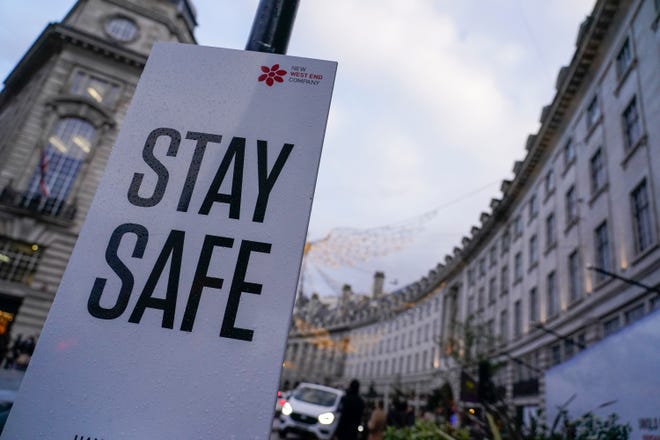Within days of its discovery, fears over the omicron COVID-19 variant have spread across the globe, sending stocks tumbling, prompting travel restrictions and drawing international attention to an uptick in cases in South Africa.
The reaction is happening weeks faster than the world’s sluggish response to the delta variant. By the time delta was named a “variant of concern” by the World Health Organization in May 2021, it had already spread in India for months and had been seeded across the globe.
In contrast, omicron was first reported to the WHO on Tuesday as COVID cases in South Africa have suddenly spiked to thousands per day. By Friday, it had been named and labeled a “variant of concern,” the most serious type.
Even with the fast reaction, cases have been reported in travelers in Belgium, Israel, Hong Kong and England, and Germany also has a probable case.
Experts have applauded the WHO for moving quickly to sound the alarm on omicron, and South Africa for its fast, transparent reporting on the variant.
That will kickstart studies over the next few weeks into its contagiousness, virulence, and “immune escape,” which is its ability to resist an immune response from prior infections or from vaccines, emergency physician and public health professor at George Washington University Dr. Leana Wen said.
“The level of alarm at this point is completely appropriate,” Wen told USA TODAY. “I would much rather that we take action and then find out that, actually this this variant does respond very well to the vaccines that we have.”
Early data is troubling, but incomplete, experts say.
The outbreak of the omicron variant in South Africa, where scientists first raised alarms about the variant’s spread, was like a “vertical line,” according to Dr. Eric Topol, vice president for research at Scripps Research in La Jolla, California.
“We haven’t seen anything like that,” he told USA TODAY. “The line of slope is much higher than the initial delta line.”
Topol said the number of concerning mutations to the virus may make it more contagious than previous variants, and that it is likely to have evolved in an immunocompromised person.
Also in the news:
►The CDC this week dropped its percentage of vaccinated adults in Pennsylvania by nearly five percentage points, to 68.9% from 73.7%, in what apparently was a data correction to weed out duplicates.
►The World Trade Organization is postponing its conference of government ministers set to open Tuesday after Switzerland initiated new travel restrictions following the emergence of omicron.
►Stocks sank Friday, with the Dow Jones Industrial Average briefly falling more than 1,000 points, as investors reacted to news of omicron.
📈Today’s numbers: The U.S. has recorded more than 48.1 million confirmed COVID-19 cases and more than 776,000 deaths, according to Johns Hopkins University data. Global totals: More than 260.5 million cases and more than 5.1 million deaths. More than 196.1 millionAmericans — roughly 59% of the population — are fully vaccinated, according to the CDC.
Keep refreshing this page for the latest news. Want more? Sign up for USA TODAY’s Coronavirus Watch free newsletter to receive updates directly to your inbox and join our Facebook group.
With identification of omicron, are more travel restrictions ahead?
Just when things were looking up for airlines and the rest of the travel industry, another COVID-19 variant has emerged. Early reports of the omicron variant instantly sparked restrictions on travel.
The United States, which lifted a pandemic-long travel ban from dozens of international countries including South Africa on Nov. 8, on Monday will reinstitute the ban for foreign nationals from eight African countries.
“We’re going to be cautious, make sure there is no travel to and from South Africa and six other countries in that region. Except for American citizens who are able to come back,” President Joe Biden said Friday.
Read more about what travelers need to know about the new restrictions and the potential impact on travel in the months ahead if the omicron variant spreads rapidly across the globe.
– Dawn Gilbertson, USA TODAY
Omicron’s impact on vaccines unclear, but contingency plans already rolling out
Health experts have said it will likely be weeks before the world has good data about how omicron may reduce the effectiveness of current vaccines, but Moderna has already announced a three-point strategy to combat the new variant.
Omicron’s mutations could possibly reduce current vaccines’ effectiveness, but are unlikely to eliminate their benefit, according to Dr. Ashish Jha, dean of Brown University’s School of Public Health.
“There are a series of mutations in key regions that may impact effectiveness of our vaccines,” tweeted Jha on Friday. “Render vaccines useless? No. Super unlikely.”
Moderna’s strategy involves three options for boosting COVID-19 vaccination, should omicron prove problematic for current vaccines.
The three options, according to a Friday release from the company: A higher dose booster, shots currently being studied that are designed to “anticipate mutations such as those that have emerged in the Omicron variant” and an omicron-specific booster — which is already in the works.
Andy Slavitt, who previously served as President Joe Biden’s White House senior adviser for COVID response, said in a tweet that both Moderna and Pfizer-BioNTech have estimated a vaccine to combat a new variant could be developed in about 3 months, with some regulatory and logistical hurtles to follow.
“If we start in early December, new vaccines could be available by summer in much of the world,” Slavitt tweeted.
Multiple media organizations on Friday reported Pfizer-BioNTech is studying the new variant and expects data within weeks. If warranted, a targeted vaccine could be developed within 6 weeks and ship within 100 days, the reports say.
Johnson & Johnson is also testing its current vaccine against omicron, according to CNBC.
– Joel Shannon, USA TODAY
Contributing: The Associated Press




















